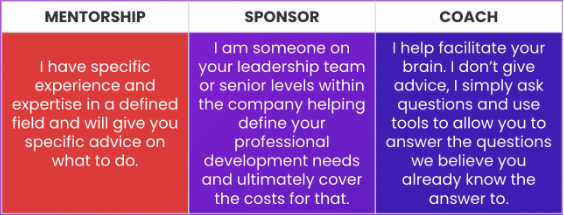
Are you looking for a coaching partner to support your L&D initiatives in 2023? Here are a few criteria to think about when choosing the right partner for your company:
At Sayge, we believe coaching unlocks everything – potential, personal and professional growth, opportunities, you name it. It’s no surprise that more companies are realizing the impact of coaching on their people and culture, with 93% of companies reporting significantly less employee turnover when they offer coaching as a benefit to their people.
However, with so many options, it can be difficult for companies to know how to find the right coaching partner for their employees. To help you navigate this process, we’ve put together a quick guide outlining key considerations when looking for a coaching benefit:
1. Coaching Quality
At Sayge, quality is our top priority. In this day and age, just about anyone can call themselves a coach. That’s why looking for a partner that has excellent coaches should be top priority. Quality coaches should be ICF trained and certified, have an ACC, PCC or MCC depending on the level of seniority, and go through a rigorous interview and onboarding process. Your coaching provider should also follow the ICF Ethics guidelines along with the Core Competencies. Confidentiality in what is discussed during the coaching sessions is top of mind! The ICF is the International Coaching Federation that provides guidelines on coaching and insights into its benefits.
That said, it’s important to make sure the coaching partner has high standards for the coaches they supply your people. They should also give you a clear definition of what coaching is, given it’s often confused with advice-giving or mentorship. A good coach will help bring out your potential which brings above true change, not impose their own ideas and solutions.
Key questions to ask your coaching partner:
- How do you screen and qualify your coaches for quality?
- How many of your coaches have ICF certifications?
- How do you define coaching?

2. Scaleability
We’ve all secured products or companies in the past that don’t grow alongside our needs or growth, it’s a headache. With coaching, you’re creating more than just a product-relationship, it’s a human relationship. That’s why you want to ensure that the service provided will stay consistent and grow with your team as it changes.
Ask the company how they ensure the quality and experience of their services remain consistent as your company evolves. Look for a partner who is committed to customer experience and aligned with your level of service expectations.
Key questions to ask your coaching partner:
- How do you keep the quality of your coaching as my company scales?
- What’s your approach to customer experience?
- What’s your SLA?
3. Testimonials & NPS score
For example, Sayge currently has a +69 average satisfaction Net Promoter Score (NPS) compared to the L&D average of -8. NPS which is a testament to our quality of service.
Key questions to ask your coaching partner:
- Do you have 1-2 clients we could speak to as a referral?
- What is your NPS score?
- How do you handle dissatisfied customers?
4. ROI
Investing in your people is an investment in your business, and a great coaching partner will understand this. They should work with you to understand your team’s goals, collaborate on what success looks like, and report back on progress to make the process as effortless as possible. After all, there’s a 788% ROI on executive coaching and, as people leaders, we know how important it is to prove that value.
Key questions to ask your coaching partner:
- What metrics can I expect you to report back on?
- How do you measure success?
- How do you define success?
5. Diversity, Equity, and Inclusion
One way to do this is to understand how they do their matching, as well as to look at their coaching base to understand the diversity of their coaches. To feel most comfortable in their coaching partnership, a staff member may need to work with someone who has a similar work background or trajectory to them, for example. Race and ethnicity can also play a significant role in this. You’ll want to be sure to collaborate with a partner who truly listens to what your people say they need to get the most out of their coaching engagement.
- How do you match coaches and coachees?
- How do you keep in mind an individual’s needs when matching coachees?
- How do you prioritize DEI in recruiting coaches?
6. Culture & Values Alignment
Choosing the right coaching startup can be difficult! By considering the above factors, you can be sure to find a partner that is the right fit for you and your company’s needs. Remember, the coach-client relationship is a partnership, so take the time to find the right fit for you.
- What are your company values?
- Can you give us an example of how your company values have positively impacted a client relationship in the past?
- How do you make sure your coaches are aligned with your core values?